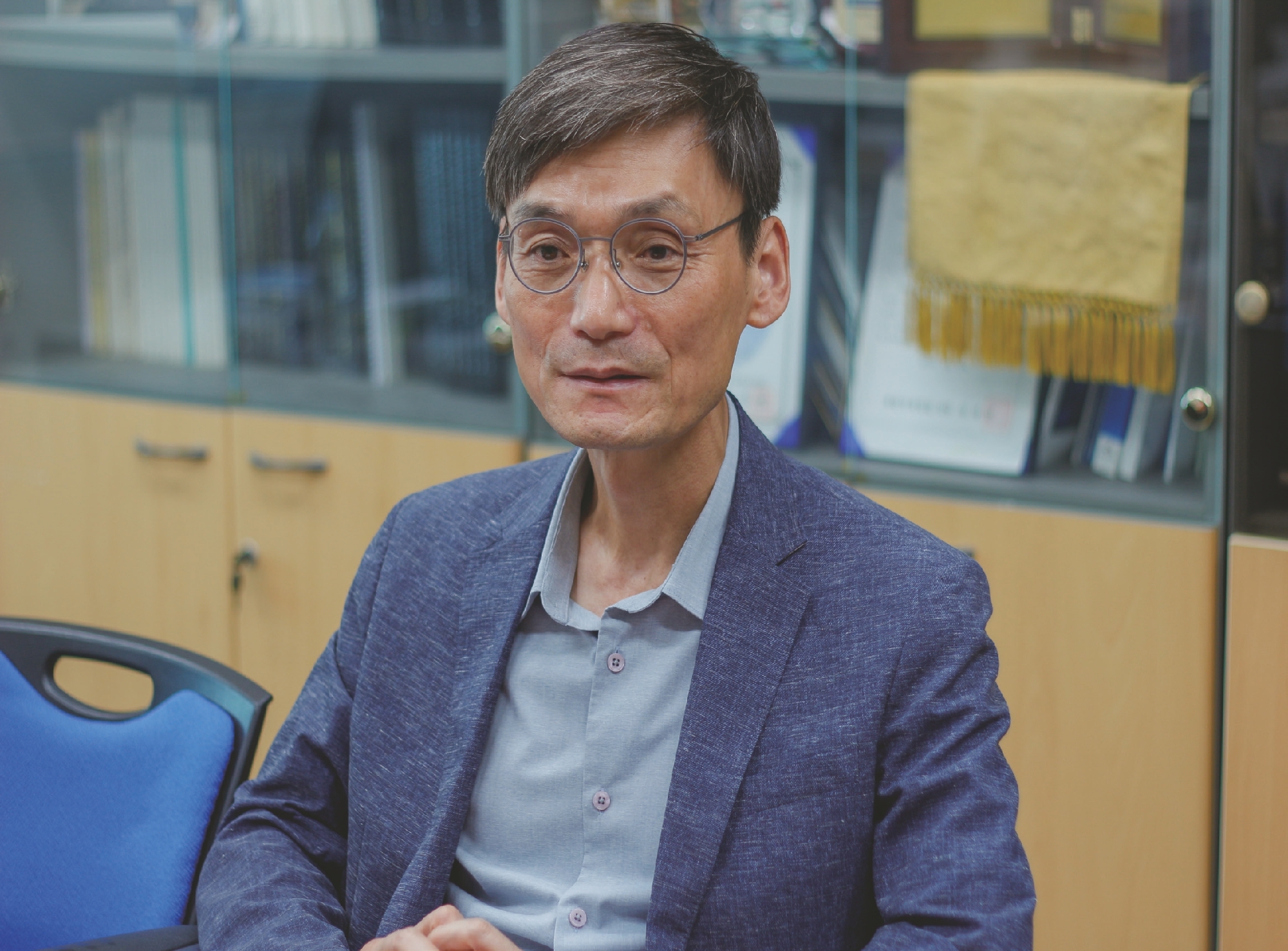
 ▲ Donghwan Kim, the President of SeoulTech
▲ Donghwan Kim, the President of SeoulTech
On Thursday, July 13, the 13th SeoulTech Presidential Election was held, featuring three candidates competing for the position. The campaign proceeded with the Electoral Commission distributing profiles of the candidates and their pledges to help students learn more about their voting options. Before the election, the candidates participated in numerous speech events and Q&A sessions, allowing students to delve into the details of each candidate's plans. Voting took place online, and the votes were counted in the 100th Memorial Hall. In the end, Professor Donghwan Kim, candidate number 2, was elected with a total of 3,167 votes, representing 52.704% of the eligible voters.
An Interview with SeoulTech President
In response to the result, The SeoulTech conducted an interview with the newly-elected president on July 24, with questions collated from SeoulTech students.
Q1. Could you briefly introduce yourself?
A1. Hello, I'm Professor Donghwan Kim who was recently elected as President of SeoulTech. I was appointed as a lecturer in 1998 and have been a professor in the Department of Mechanical System Design Engineering for 25 years, as of this year. I have also studied at a number of national research institutes and companies and served as Head of the Research and Industry University Cooperation Foundation as well as Chairman of the Faculty Council, both here at SeoulTech.
Q2. You're planning to supplement and improve the ST Semester System. We wonder in what direction you are planning on going with this.
A2. I think the current semester system has some benefits in that it gives students more learning options throughout the vacation. However, it presents administrative challenges. For instance, for first-year freshmen, their final admission to the university is decided after the school year begins, which causes various issues. To address this, the opening will move to early March, in line with other universities, and the schedules for the seasonal semester and Discovery Semester will be adjusted. In addition, other improvements are needed because I think that online classes can be less rewarding than attending classes in-person.
Q3. In your campaign, you said you would improve the relative evaluation system for academic performance. Do you have any details on how you will do this?
A3. l came up with this pledge because our university has a low grade rating. I am working to improve this from next year. For example, increasing the ratio of A+ to A0 and lowering the ratio of B+ to B0 could be one method. Another approach could be to increase the ratio of A to B grades. This will ensure that students are not at a disadvantage in gaining employment after graduation. While getting good grades is clearly something all students wish for, I will carry out this pledge in a way that maintains fairness so that hardworking students don't suffer from grade inflation.
Q4. Another pledge you made was to improve students’ residential and living environments. We wonder how you are planning to realize this pledge.
A4. I made the "1,000 won morning" pledge to encourage students to live healthily by eating breakfast. If there are problems with labor costs or staffing, another way could be to provide something simple such as bread or noodles. This is a pledge that can only be carried out when students’ demand is high, so I will conduct a survey to gauge the level of demand in advance. I will proceed from the second semester of next year using data from the survey.
Q5. There is lots of feedback from students saying that dormitories need to be improved. What do you think about this?
A5. When I visited the dormitories, I found that the facilities were poor. In particular, I've heard lots of complaints about the ban on installing refrigerators and on having delivery food inside the dormitories. As a solution to this, I will allow refrigerators to be installed, because they don't carry a significant fire risk. In addition, with regards to delivery food, I will first consider whether students living there will be able to independently dispose of their waste. After this, I can consider permitting delivery food in the dormitories.
Q6. As President of SeoulTech, do you have a vision for international education, international exchange, and language education?
A6. The reason that some foreign students are denied admission to SeoulTech is that they do not have the required Korean language skills to follow classes in their selected major. This also means that others who hear about our Korean language requirements choose not to apply to SeoulTech. I think this situation needs addressing. Through International College, I plan to establish a system that sufficiently supports Korean language skills development in the 1st and 2nd grade and allows students to take their major classes in the 3rd and 4th grade. Through this process, I believe that students will acquire the level of Korean language skills and confidence to greatly reduce difficulties in taking their major classes. After finishing the 3rd and 4th grade, my aim is for our foreign students to enter SeoulTech's graduate school so they can obtain master's and doctorate degrees and have the chance to build a career, possibly with companies here in Korea. This whole process is what we call 'Global Education Total System.’
Q7. There is perception that exchange students have a narrow range of choices, except for students in the College of Engineering. What are some possible solutions to this issue?
A7. As SeoulTech has a lot of College of Engineering students, it seems that the international exchange program is biased towards these students. However, I will support the expansion of the exchange programs so that they provide not only for students of College of Engineering but also for those studying in the College of Humanities & Social Sciences and College of Art & Design.
Q8. We'd like to hear your opinion on the establishment of International College.
A8. As I said earlier, I think International College can play the most important role in the ‘Global Educational Total System’ for foreign students. I see this as a groundbreaking system in that foreign students can improve their Korean language skills at the same time as taking their major classes. To this end, I will support International College by securing more professors and management staff. Furthermore, I plan to run English lectures for foreign students who are familiar with English.
Q9. Staying on the topic of exchange programs, our overseas university sisterhood exchanges are in particularly high demand. Are you willing to add more?
A9. Yes. The majority of our students prefer American universities, so, to this end, I have confirmed a list of American universities who are open to a sisterhood relationship with us, and I will develop these relationships going forward. In addition, I will expand the range of sisterhood relationships so that students can take advantage of our sisterhood network. At the same time, we will maintain existing MOU contracts, expanding those that are popular with students and winding down those that are not.
Q10. Which of SeoulTech's values do you want to emphasize and pursue?
A10. The first value I want to emphasize is that SeoulTech is a national university in Seoul developing the personnel of the future in an education and research environment that is responsive to new industries. The second is that our university has excellent professors who are passionate about R&D, which creates an overall culture of future-focused and rational decision-making. With these values in mind, I want to develop new and various educational programs so that SeoulTech grows as a university that anyone with ambition admires.
Q11. Finally, as you were recently elected as President of SeoulTech, what else would you like to say?
A11. Our university has a rich history and has made a lot of progress, but it is also a reality that we face considerable challenges as we go further. If the government or society asks why SeoulTech should remain a national university, I think we are able to answer it by pointing to the two core SeoulTech's values that I have just emphasized. By pursuing these values, SeoulTech will offer so much going forward.
Through this interview with the President Donghwan Kim, The SeoulTech was able to confirm his vision and future. We hope that our university can develop further through his pledges.
Reporter,
Minju Kim alswn020716@g.seoultech.ac.kr


 Comment 0
Comment 0 Posts containing profanity or personal attacks will be deleted
Posts containing profanity or personal attacks will be deleted